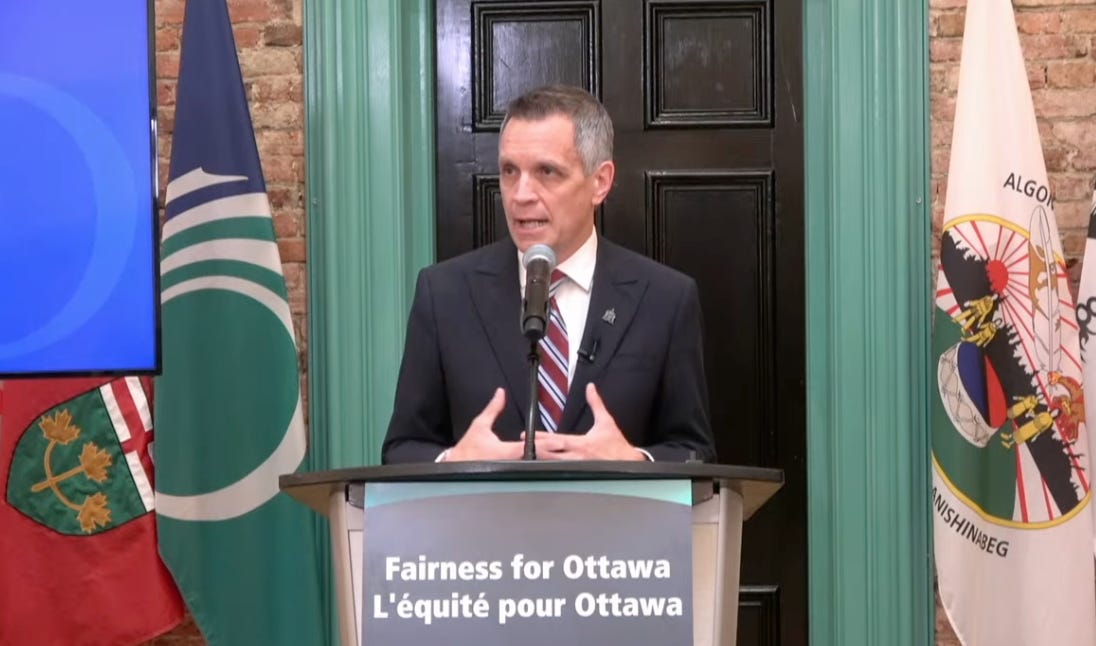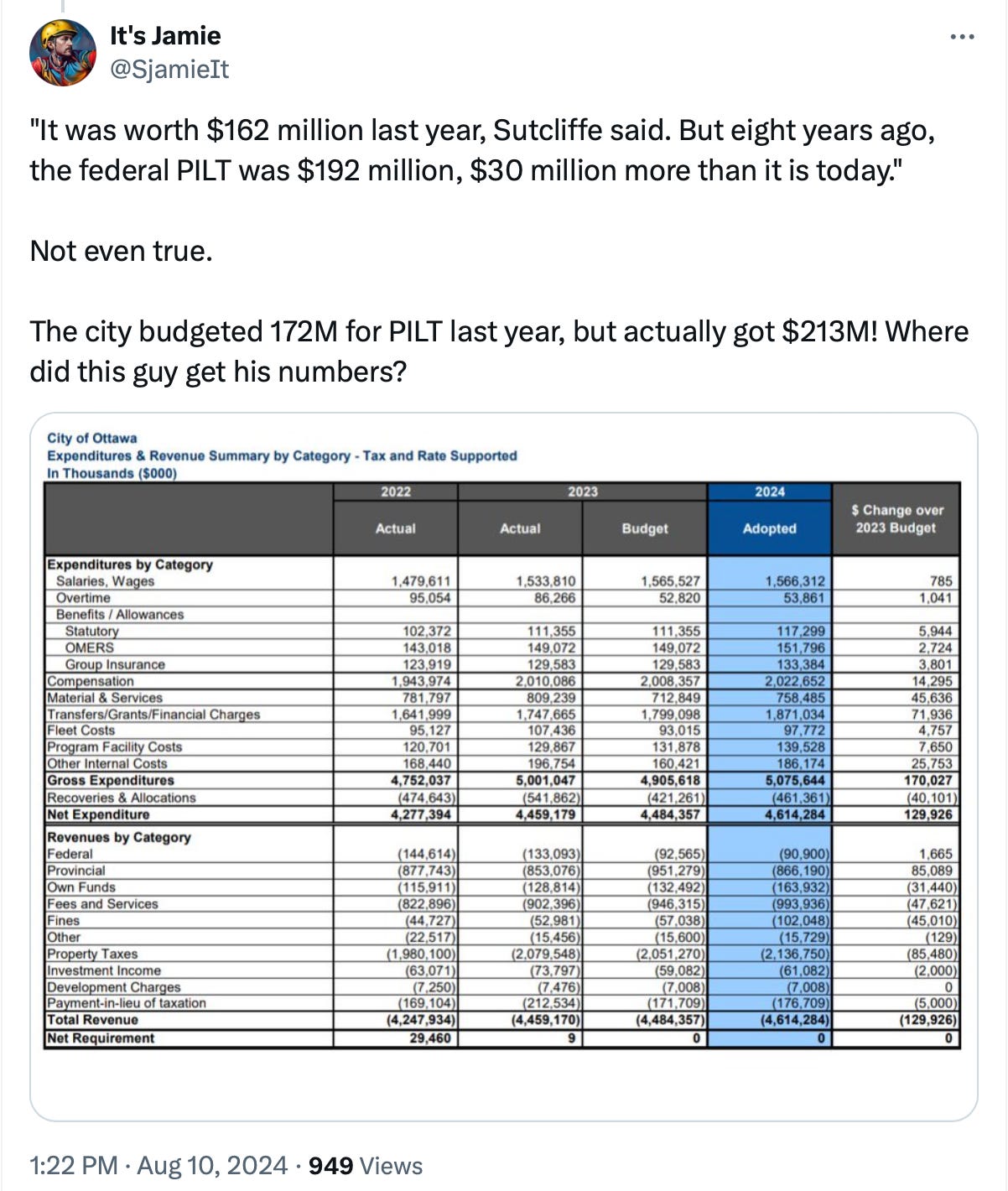Take Responsibility for Your Actions, Mr Mayor
Part 1: Yes, other levels of government could do more. But the City of Ottawa is the main author of this fiscal mess.
A lot has been said about Sutcliffe’s special announcement of the City’s fiscal crisis on Thursday. Some of my thoughts were included in articles by the CBC and the Ottawa Citizen.
Today, I’m digging into the main issues that have been talked about publicly.
In a follow-up article, I’ll discuss something that no one is talking about, but which deserves far more attention, namely, the real reason that City finances are in such trouble.
Look out for part 2 of my analysis coming later this week.
Someone else’s fault
“This is a crisis that is not of our own making.” — Mark Sutcliffe, 8 August 2024
Last Thursday, the Mayor put out a special announcement. He talked about the fiscal crisis facing the City of Ottawa because other levels of government are not paying their fair share. He called on the people of Ottawa to lobby provincial and federal parliamentarians for “fairness for Ottawa”.
Specifically, he called out unfairness in two areas.
PILTs. The federal government doesn’t technically pay property taxes on their buildings and lands. Instead, the feds make “payments in lieu of taxes”, which they get to set. The City claims that the federal government is underpaying by about $95m a year.
Transit. Ottawa has a transit deficit of about $140m a year. He blames that on federal public servants not returning to work, and wants the federal government to recognize its responsibilities to the City. He also blames both the federal and provincial governments for not paying their customary 1/3rd shares of capital costs for new transit projects.
Sutcliffe compares these shortfalls to what it would cost in increased property taxes. Since a 1% property tax increase is equal to about $20m, the PILT shortfall would be equivalent to about a 5% increase, while the transit deficit would be equivalent to a 7% deficit.
Feds asked and answered
Sutcliffe put out a call to higher levels of government and warned that, if he doesn’t get a response within 60-90 days, services will have to be cut or property taxes increased in Ottawa. (Municipal governments cannot run budget operating deficits. They can only use debt to finance long-term capital projects.)
Federal Minister and former Ottawa City Councillor Jenna Sudds responded quickly, basically telling Sutcliffe to sort it out yourself.
Provincial New Deal for Ottawa
The feds have effectively said no to this City request. What can we expect from the provincial government?
The province will say that they made a decision on this back in March, with the New Deal for Ottawa. I have written previously about what was in that deal, but essentially the City asked the province for a police station and a highway interchange.
Olivia Chow got $330m in transit operations funding for her New Deal for Toronto a few months prior. Sutcliffe didn’t even ask for transit funding when he had his chance.
I’m sure the province feels this whole issue was settled in March, and have no intention to bail out the City a second time.
Don’t hold your breath waiting for the federal or provincial governments to come to our rescue. But what about the substance of the Mayor’s announcement?
PILTs are a valid concern
Sutcliffe is correct that the federal government should be paying more in PILTs. The City of Ottawa should not be subject to the vagaries of the federal government and how it decides to value its properties.
But he doesn’t help himself with his confusing presentation of the issue. At one point Sutcliffe says the feds should be paying $95 million more a year. Then, he asks the feds to pay back their underpayments over the past 5 years, equal to $100 million. So is the annual gap $20 million or $95 million?
Furthermore, as It’s Jamie points out on Twitter, the Mayor’s numbers aren’t even the numbers that the City reported in its own budget.
PILTs are a valid issue, but the City has little credibility if their claims are not supported with accurate data and reliable analysis, or even match what is in their published financial statements. [It is worth noting, however, that the budget table above includes both federal and provincial PILTs].
Transit woes are more than work-from-home
The City of Ottawa reports a $140m a year transit operating deficit, and that work-from-home is contributing to Ottawa’s low ridership numbers.
But transit is 38% lower than 2019, creating a revenue shortfall of $36m. What explains the other $104m shortfall?
Sutcliffe failed to acknowledge the main reason OC Transpo has a poor outlook is that the public have lost trust in the ability of transit to get you to your destination on time.
Decisions made at City Hall to cut services and raise fares have turned OC Transpo into a “last choice” transit system.
Transit has become too unreliable and too slow, to the point that most people with options choose something other than the bus or train.
We agreed to the transit capital formula
Sutcliffe also complained that the City of Ottawa pays more for transit capital investments than Toronto and other GTHA municipalities pay.
The usual formula is a one-thirds split of capital costs between federal, provincial and municipal governments.
That one-thirds split is essentially what we agreed to. We also agreed that the city would pick up any cost overruns.
And that’s what happened. Our initial LRT capital planning was based upon Jim Watson’s ridiculous campaign promise to be “on budget and on time”. Even though Watson only had a ballpark estimate of costs at the time.
It was bad politics reinforced by senior city staffers who didn’t have the courage to stand up and tell Emperor Jim that he had no clothes on.
The City has no one to blame here but themselves.
Sutcliffe inherited many of those problems. But the City Manager he appointed, Wendy Stephenson, was front and centre in all these decisions in the City’s finance department.
Sutcliffe had the choice to make a break with the City Hall culture that gave us these problems. Instead, he chose to reinforce and strengthen that culture.
A crisis of our making
The City of Ottawa has a $5.8 billion budget for 2024 — $4.6 billion in operations and $1.2 billion in capital investments.
That’s a lot of money, although much of that is hard to move around. Of the discretionary resources available, Sutcliffe’s priorities include spending $500m to rebuild the Lansdowne stadium, despite that stadium having another 40+ years of operational life in it.
Or spending $48m on police operations and mental health services, including policing in the Byward Market, on transit and a new Rideau Centre police station which seems to be having little impact other than to shift homelessness from the Byward Market to Centretown.
This is a fiscal crisis primarily of our own making.
Development choices are the real problem
What Sutcliffe doesn’t understand is that the real issues with municipal finances runs much deeper.
The city has an unsustainable growth plan, which we cannot afford.
No one has been talking about this. I’ll provide my thoughts in a follow up Part 2 post later this week.
12 August UPDATE. A reader pointed out that the $50m for the Rideau Centre police station is actually $48m and includes station operations plus increased police staffing for the Byward Market and on transit, and for mental health services. Another reader noted that the budget table showing “payments in lieu of taxes” provided by another author includes PILTs from federal as well as provincial sources. This article has been updated accordingly.






Very well said. Looking forward to part 2 and what I assume will include a complete call out and tear down of Tewin.
Not sure but doesn't the PILT line in the city's financial statement include provincial allocations and those of federal agencies and crown corporations?